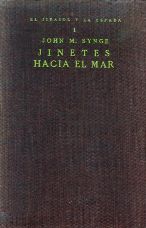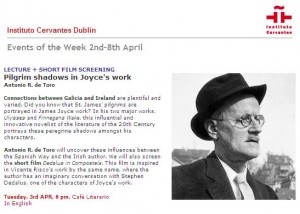Blog del Instituto Cervantes de Dublín
Torre Martello
Lecture: The Irish Literature in Spain | Conferencia: La literatura irlandesa en España
 The second talk of the Historical Dialogues series will be held today at 6.30pm in Café Literario. Professor Antonio R. de Toro will be with us to talk about the Irish Literature in Spain.
The second talk of the Historical Dialogues series will be held today at 6.30pm in Café Literario. Professor Antonio R. de Toro will be with us to talk about the Irish Literature in Spain.
The Nobel Prize Juan Ramón Jiménez was very familiar with the writers of the Irish revival. His reading of Yeats is well-documented, and in a hand-written list for the years 1917-1920 he also notes the four major writers of the early years of the century in Ireland: A.E., Yeats, Lady Gregory and Synge. Juan Ramón Jiménez confesses that at the beginning of the century the poets who most profoundly influenced him were Irish. This interest is also reflected in his and his wife Zenobia’s translation of Synge’s Riders to the Sea into Spanish in 1920. After 1916 his translations of poetry included works by A.E. and Yeats, as he admits in a letter to Luis Cernuda.
According to Jiménez, Riders to the Sea left its mark on García Lorca’s Bodas de sangre. And Ian Gibson goes on to state that this play may not had been written had not Lorca read Synge’s play.
Several Irish literary works were translated into Spanish. Apart fom Synge’s play, Alfonso Donado’s translation (pseudonym of Dámaso Alonso) of Joyce’s A Portrait of the Artist as a Young Man, rendered as El artista adolescente and published in Madrid in 1926 and soon afterwards William Butler Yeats.
The authors mentioned above are not the only Irish writers translated into Spanish in book form, but only those, with the exception of Joyce, who were related in some way to the Irish Literary Revival.
Antonio R. de Toro is professor of English Philology at the Universidade da Coruña. He is director of Amergin University Institute of Research in Irish Studies. Vicente Risco (Orense, 1884-1963), influenced by James Joyce’s work, was one of the most influential and complex figures of Galician literature.
La segunda conferencia del ciclo de conferencias Diálogos Históricos será hoy a las 18:30 en el Café Literario. El profesor Antonio R. de Toro estará con nosotros para hablarnos sobre la literatura irlandesa en España.
El Premio Nobel Juan Ramón Jiménez era buen conocedor de los escritores del Renacimiento irlandés. Sus lecturas de Yeats están bien documentadas y en una lista manuscrita que abarca los años 1917-1920 Juan Ramón destaca los cuatro escritores irlandeses más importantes de principios del siglo XX: A.E.: Yeats, Lady Gregory y Synge. Juan Ramón Jiménez llegó a admitir que los poetas de principios del siglo XX que ejercieron una mayor influencia en su obra eran irlandeses. Este interés también se refleja en su versión de la obra Jinetes hacia el mar (Riders to the Sea) que él y su esposa Zenobia tradujeron al español. A partir de 1916 sus traducciones de poesía incluyen obras de A.E y de Yeats, tal y como se lo comunica en una carta a Luis Cernuda.
En opinión de Juan Ramón Jiménez, Jinetes hacia el mar influenció la obra Bodas de Sangre de Federico García Lorca. Ian Gibson ha llegado a afirmar que esta obra no se habría escrito si Lorca no hubiese leído la obra de Synge.
La literatura irlandesa traducida al español es variada. Además de la obra de Synge mencionada, se encuentra la traducción de la obra de Joyce El artista adolescente (A Portrait of the Artist as a Young Man) de Alfonso Donado (seudónimo de Dámaso Alonso) y publicada en 1926 en Madrid. Un poco más adelante se tradujeron obras de William Butler Yeats.
Los autores aquí mencionados no son los únicos escritores irlandeses traducidos y publicados en español, pero son los únicos, a excepción de Joyce, que estaban relacionados en cierta medida con el Renacimiento literario irlandés.
Antonio R. de Toro es catedrático de Filología inglesa de la Universidad de A Coruña y director del Instituto Universitario de Investigación de Estudios Irlandeses “Amergin”.
Las sombras del peregrino en la obra de Joyce / Pligrim shadows in Joyce’s work

Lamentamos comunicarles que la actividad “Sombras peregrinas en la obra de James Joyce”, prevista para hoy 3 de abril a las 18h en el Café Literario ha sido cancelada.
Rogamos disculpen las molestias.
We are sorry to inform you that the Lecture + Film Screening “Pilgrim shadows in Joyce work”, scheduled to take place today April 3rd at 6pm at Café Literario, has been canceled.
We apologize for any inconvenience caused.
Las conexiones entre Galicia e Irlanda son abundantes y variadas. ¿Sabías que los peregrinos de Santiago son retratados en la obra de James Joyce?
En sus dos obras principales, Ulises y Finnegans Wake, el novelista más influyente e innovador de la literatura del siglo XX dibujó las sombras de los peregrinos entre sus personajes.
Antonio R. de Toro se detendrá en su conferencia a analizar las influencias entre el Camino de Santiago y el autor irlandés.
Durante la velada, se proyectará también el cortometraje Dedalus en Compostela. Esta película está inspirada en la obra de Vicente Risco con el mismo nombre, donde el autor tiene una conversación imaginaria con Stephen Dedalus, uno de los personajes de la obra de Joyce.
Conferencia + proyección de cortometraje.
Martes, 03 de abril, 6 pm. Café Literario
En Inglés
Connections between Galicia and Ireland are plentiful and varied. Did you know that St. James’ pilgrims are portrayed in James Joyce work?
In his two major works, Ulysses and Finnegans Wake, this influential and innovative novelist of the literature of the 20th Century portrays these peregrine shadows amongst his characters.
Antonio R. de Toro will uncover these influences between the Spanish Way and the Irish author.
We will also screen the short film Dedalus in Compostela. This film is inspired in Vicente Risco’s work by the same name, where the author has an imaginary conversation with Stephen Dedalus, one of the characters of Joyce’s work.
Lecture + Short film Screening.
Tuesday, 3rd APR, 6 pm. Café Literario
In English



